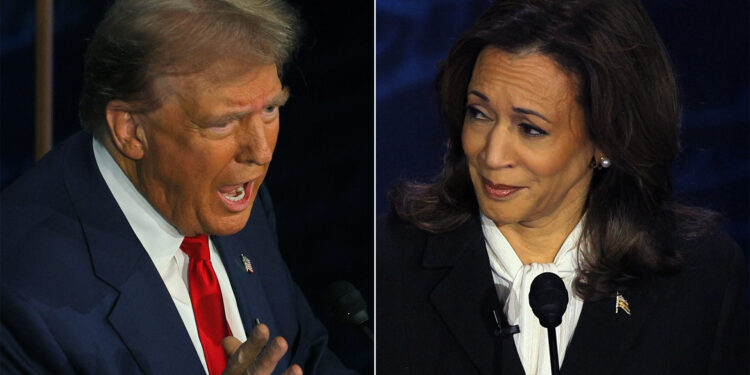The US Federal Budget Committee expected that the economic plans proposed by presidential candidate Donald Trump, if he wins and the implementation of those plans, will lead to an increase in the federal debt by about double the expected increase of the economic plans proposed by his rival Kamala Harris.
According to the nonpartisan committee’s analysis, the federal debt would likely swell by 2035 by $7.5 trillion if the former president wins the presidency and follows through on his pledge to cut taxes on individuals and corporations, implement significant tariffs on imported goods and deport millions of immigrants, among other measures he intends to implement.
Harris’ program, which expands tax breaks for small businesses and improves access to child care and affordable housing but increases taxes on medium and large businesses, is expected to increase the federal debt by $3.5 trillion over the same period.
Financial crisis
The report, which warned of the high risk of an “eventual financial crisis,” comes just 5 weeks before the US presidential elections, and opinion polls indicate a rapprochement between the two candidates who have made the economy a focal point of their campaigns.
According to the US Federal Budget Committee report, the next president “will face significant financial challenges upon assuming office, including record debt levels, large structural deficits, rising interest payments, and the bankruptcy of critical credit fund programs.”
The committee warned that growth would slow and US national security would be weakened by the high debt burden.
The Financial Times reported that the analysis highlights the extent to which Trump has abandoned the financial prudence that Republican candidates and conservative politicians often demonstrated when running for the presidency.
In addition to extending the tax cuts he passed in 2017, Trump recently pledged to enact new tax cuts if he wins office again.
Tax deductions
The cuts ranged from reducing the corporate tax rate to individual-level tax cuts on income from overtime pay, tips and pensions, and he also promised to eliminate caps on tax deductions for state and local tax payments that were particularly disliked by wealthy suburban homeowners.
According to the Fed, these tax cuts and other relief alone would increase the debt by about $9 trillion, and sweeping tariffs and other duties would offset that $3 trillion increase.
Republicans have called in the past for deep cuts in spending, including government health care and pension programs, to make up for tax cut plans, but Trump has said he does not want to cut these plans, and wants to cut spending on a much smaller slice of the government budget that affects domestic programs. Others, while relying on tariffs to boost revenues.
The most expensive parts of Harris’ program revolve around the tax cuts and credits that she wants to extend to families with incomes of $400,000 or less, as well as families with young children. Together, these cuts are expected to increase the debt by more than $4 trillion, which will be partially offset by… A windfall of about $1 trillion resulting from an increase in the corporate tax rate from its current level of 21%.
While President Joe Biden has backed a significant increase in the capital gains tax rate, from 20% to 39.6%, Harris proposes increasing it by a smaller rate to 28%, limiting the revenue boost.
Debt expansion
Given the uncertainty about who will win, what policies will be enacted and how the economic outlook will evolve, the range of outcomes for debt is very large, the FOMC noted in its report.
At best, Harris’ program will not add to the deficit, and at worst it will increase it by $8.1 trillion. As for Trump’s program, it is likely to increase the deficit by between $1.45 trillion to slightly more than $15 trillion.
American debt amounts to 99% of gross domestic product, according to the Congressional Budget Office, and it is expected to rise to 125% 10 years from now if there are no changes in current laws.
Under Harris, this would rise 8% to 133% of GDP, but a Trump victory would increase it by 17% to 142% of GDP.



